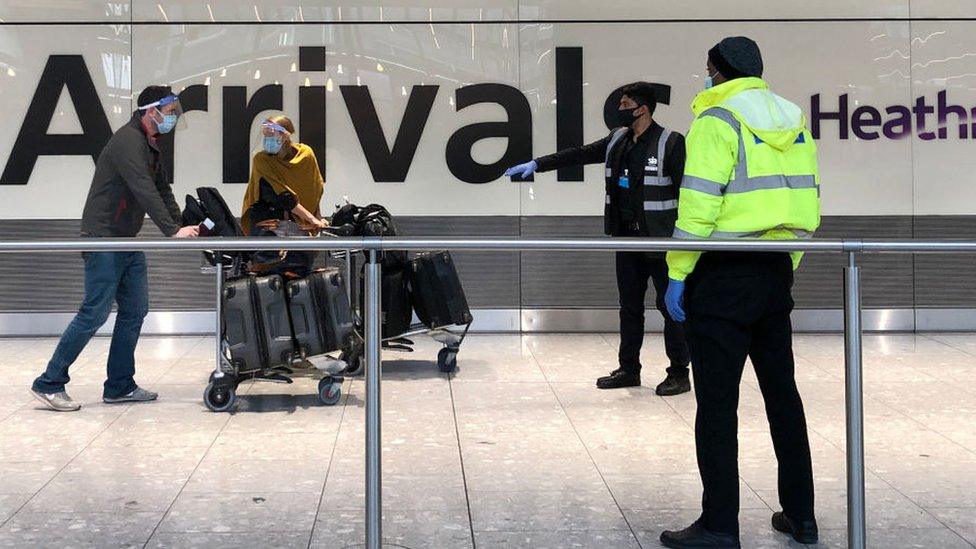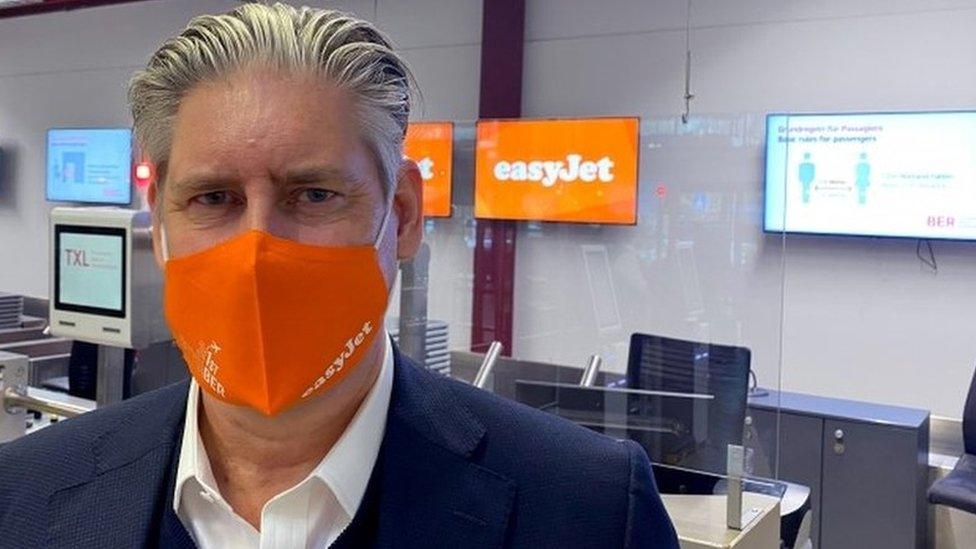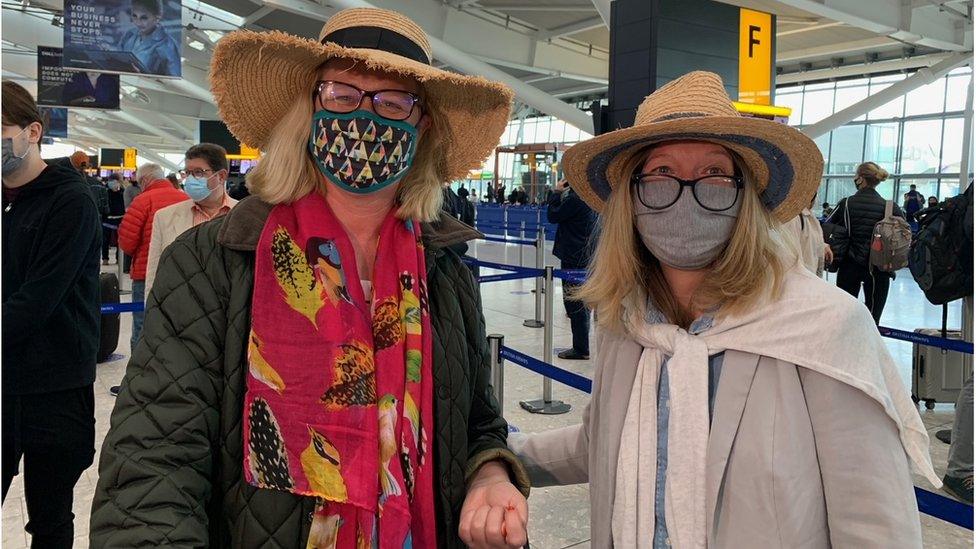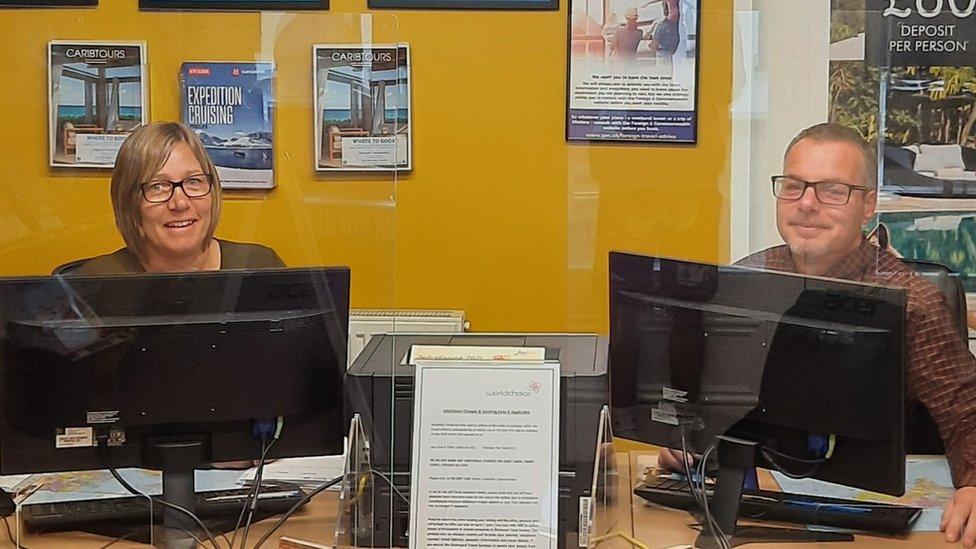Travel sector dismay as Portugal faces tougher rules
- Published
- comments

The travel and tourism industry has hit back after the announcement of tighter rules on foreign holidays.
No more countries will be added to the green list and Portugal will be relegated to amber from next Tuesday.
The government said Portugal had seen a doubling of infection rates since the previous travel review.
Critics warned of a loss of jobs and confidence, while Easyjet said the government had torn up its own rules.
Moving Portugal from the green to the amber list was a "safety first approach" to "give us the best chance of unlocking domestically", said Transport Secretary Grant Shapps.
Labour said moving Portugal from green to amber on the UK's foreign travel system was "not the answer" and called for the amber list to be scrapped altogether.
Labour's shadow home secretary Nick Thomas-Symonds accused the government of causing "chaos with the mishandling of travel restrictions at the border".
In addition to not adding countries to the green list and relegating Portugal to amber, seven more countries have been added to the red list.
All the changes will take effect on Tuesday at 04:00.
In England's traffic light scheme, external, countries are classed as green, amber or red - with different rules for quarantine and Covid tests.
Scotland, external, Wales, external and Northern Ireland, external have similar rules.
The government says you should not holiday, external in red or amber destinations - which means most countries. Holidays to countries on the green list can go ahead without quarantining when you return.

There had been some speculation that Greek and Spanish islands could be added to the green list as well as Malta, Finland and parts of the Caribbean - but the government insisted it had to remain cautious.
What has changed in Portugal?


The UK government announced that Portugal would be on the travel green list on 7 May.
Its low point for new cases (on a seven-day average) was 10 May and the number has been rising gradually since then.
On 2 June, there were 5.4 new cases per 100,000 people per day, which was only a touch higher than the UK at 5.1, although differences in the amount of testing being done make that comparison difficult. It is considerably higher than Israel, for example, which is still on the green list and had 0.2 new cases per 100,000 that day.
The decision about which countries go on the green list is not just about the number of new cases, but a number of other criteria, such as the amount of testing capacity. That has not changed dramatically in the past month.
Presence of variants of concern (VOCs) is also important. The latest report from the World Health Organization says all four VOCs have now been found in Portugal. A month ago, the variant first identified in India was not yet a VOC. The transport secretary says a new mutation of that variant has now been found in Portugal.

'Torn up rule book'
British Airways said this was "incredibly disappointing and confusing news, not just for aviation but also for our customers".
"The UK has reached a critical point and urgently needs travel with low-risk countries, like the US, to re-start the economy, support devastated industries and reunite loved ones," a spokesperson said.
Johan Lundgren, Easyjet's chief executive, said that with "Portuguese rates similar to those in the UK", relegating the country "simply isn't justified by the science".
"When this framework was put together, consumers were promised a waiting list to allow them to plan.
"Yet the government has torn up its own rule book and ignored the science, throwing people's plans into chaos, with virtually no notice or alternative options for travel from the UK.
"This decision essentially cuts the UK off from the rest of the world," he said.
Jet2 said it would delay restarting flights from 23 June to 1 July.
"We know how disappointed our customers and independent travel agency partners will be following today's announcement, and we share their concerns and frustrations," said Steve Heapy, Jet2 chief executive.
Charlie Cornish, Manchester Airports Group chief executive, said: "We were told the traffic light system would allow people to travel safely, with the right measures in place to manage risk for different countries.
"But it is now clear the government doesn't trust its own system and that international travel is being unfairly scapegoated, with tens of thousands of jobs placed at risk in the process.

Mr Lundgren says people want to go on holiday as soon as they can
John Holland-Kaye, chief executive of Heathrow Airport, said: "Ministers spent last month hailing the restart of international travel, only to close it down three weeks later, all but guaranteeing another lost summer for the travel sector.
"Everyone wants to protect public health, but the entire point of the Global Travel Taskforce was to establish a system to unlock low-risk travel safely.
"Britain is the worst performing economy in the G7, and in the week that the prime minister hosts G7 leaders to launch his government's vision of Global Britain, he's sending a message that the UK will remain isolated from the rest of the world and closed to most of its G7 partners."
Virginia Messina, vice-president of the World Travel & Tourism Council, called the moves a "huge disappointment for businesses and holidaymakers", a point underlined by falls in the share prices of several airlines.
She said: "The government has once again cold-shouldered travel and tourism by refusing to add any new destinations to the already slim green list.
"The UK could and should leverage its hard-won competitive advantage from one of the world's best vaccine rollout programmes, to restore mobility and reopen the doors to safe international travel."
'Safe and ready'
Paul Charles, chief executive of the PC Agency and spokesman for parts of the travel sector, said tighter restrictions "will further threaten tens of thousands of jobs in aviation and travel, not to mention further damage consumer confidence".
He said that data showed several countries should be green-listed, so the government's decision "defies logic" and was being driven by "a policy of fear".
John Foster, the CBI's director of policy, said businesses across the country were "losing out on key links with trading partners just as the rest of the world is opening up".
"The international travel sector is on its knees and unable to trade its way to recovery. Without a successful summer season, the government will need to consider further sector specific support to save jobs and skills essential for future growth," he added.
The Caribbean island of Grenada was hoping to be put on green, and tourism minister Clarice Modeste Curwen said she was "extremely disappointed" not to be added.
She said: "Grenada has had just 161 cases of Covid-19 since the onset of the pandemic and we have reported zero new cases locally since February.
"We strongly believe that Grenada should be added to the UK's green list as we have taken all the necessary measures to ensure the islands are safe and ready for visitors."
Shares in airlines and travel companies fell after the BBC reported that Portugal is set to move from green to amber.
IAG, the parent company of British Airways, fell 5%, with Easyjet sinking about the same. Ryanair closed 1.3% lower and Tui fell about 4.5%.

Are you in Portugal? Are you planning to travel there soon? Please share how this latest announcement will affect you. Email haveyoursay@bbc.co.uk, external.
Please include a contact number if you are willing to speak to a BBC journalist. You can also get in touch in the following ways:
WhatsApp: +44 7756 165803
Tweet: @BBC_HaveYourSay, external
Please read our terms & conditions and privacy policy
If you are reading this page and can't see the form you will need to visit the mobile version of the BBC website to submit your question or comment or you can email us at HaveYourSay@bbc.co.uk, external. Please include your name, age and location with any submission.
Related topics
- Published11 February 2022

- Published17 May 2021

- Published28 May 2021
